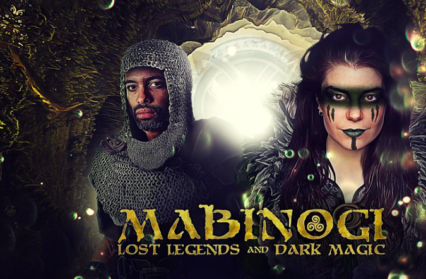Gareth Smith reviews Mabinogi: Lost Legends and Dark Magic, a BBC Radio Wales series that adapts the stories of The Mabinogion into something (mostly) family-friendly while steering clear of a Disney-esque didacticism.
The Mabinogi are remembered by many (or possibly just by me) as the bizarre and narratively convoluted Welsh fairytales that cropped up continuously throughout school. Being forced to attend pantomimes that awkwardly squeezed these morbid stories into festive fun left the lasting impression that they held little appeal for children. The BBC’s newest radio adaptation, Mabinogi: Lost Legends and Dark Magic, demonstrates that this quality is, in fact, their strength. The fifteen-part series is a reminder of how refreshingly un-Disneyfied the tales are; the noticeable lack of straightforward moral lessons, happy endings and cheerfully musical protagonists offer something darker and more adult in their place.
Writer Lucy Catherine reinvents the tales by producing a hybrid of old and new, mining the original stories for key themes and plots while introducing a distinctly modern flavour in the dialogue and characterisation. Adaptations are often met with a hostility borne from a sense of loyalty to previous versions, but such fidelity would be misplaced in relation to the Mabinogi. This is partly due to the less palatable elements in the original texts which are better excised from a primetime radio slot, but it is also because the history of the stories themselves problematise any tidy notion of ‘originality’. As the result of generations of oral tradition and collected across centuries, the narratives probably changed significantly before they ever reached the printed page. Their hallowed place in Welsh literature is also primarily indebted to the nineteenth century (when the term ‘Mabinogion’ was first applied to the collection), highlighting that these tales often tell us more about recent Welsh history than the mythological past that they depict.
This adaptation is not particularly ambitious or experimental in its approach, but the epic journeys and dramatic plot twists are crowd-pleasing and complimented by a tongue-in-cheek sense of humour. Although this desire to be self-reflexive and witty can sometimes seem a little overdone – like an awkward teenager distancing themselves from the embarrassingly serious by sneering – it mostly succeeds in making the protagonists more relatable. Featuring dozens of characters and utilising the talents of numerous actors, the show is built around the relationship between cocky Pryderi (Daragh Mortell) and sardonic Brigid (Aimee Ffion Edwards). The squabbling but affectionate patter between the Prince and Bard who are also half-siblings, is aided by the chemistry and strong performances of Mortell and Edwards. Regardless of the fantastical events befalling them, Pryderi and Brigid remain engaging and provide a reassuring narrative centre.
The bizarre circumstances encountered by this awkward teenage pair includes gory resurrections, multiple journeys into the underworld and the theft of a soul, but there is more to the adaptation than simply regurgitating familiar elements of the mythology. Mabinogi: Lost Legends and Dark Magic attempts to address the treatment of female characters in the original stories, who usually embody either purity or villainy, by focusing extensively on Brigid. Placing a same-sex relationship at the heart of the story also suggests the potential of the Mabinogi to adapt to its contemporary moment in other ways.
The overall aesthetic of the show (and the questionable artwork used for the cover on BBC Sounds) suggests that it was designed partly to appeal to a Game of Thrones demographic. It certainly delivers plenty of banqueting scenes, wind instruments and incestuous undertones, but this desire to appeal to a more mature audience sometimes causes the overall tone to oscillate. The generally family-friendly vibe is undercut by the occasional appearance of more adult themes, but perhaps this is a useful reminder that these stories are not, and have never really been, morality tales for children in the vein of other folk tales. Mabinogi: Lost Legends and Dark Magic instead focuses on the chaos and confusion that exists within the stories, reflecting the complex and often baffling world that the characters must navigate whilst exploring political upheavals, familial miseries and their own mortalities. While the series works towards a somewhat anti-climactic finale, this is perhaps setting the stage for further exploration of a disturbing, incomprehensible society which can seem both impossibly distant and uncomfortably close.
You can listen to Mabinogi: Lost Legends and Dark Magic on BBC Sounds.
Gareth Smith is a regular Wales Arts Review contributor.











